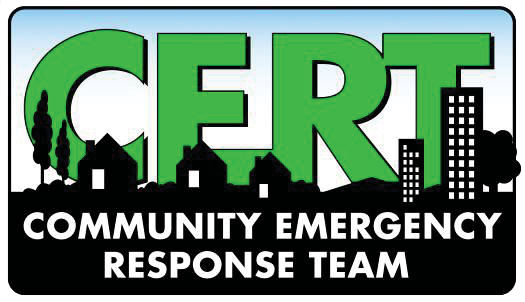Community Emergency Response Team (CERT)

The Community Emergency Response Team (CERT) program helps train citizens to be better prepared to respond to emergency situations in their home, workplace and community. CERT training is a 20-hour curriculum developed by the Los Angeles Fire Department, FEMA, and DHS, and is designed to provide individuals with basic emergency response skills, particularly those that would be of value in the initial hours–or days–after a disaster, when first responder resources may be overwhelmed and help is difficult or impossible to reach.

CERT Class Modules
- Disaster Preparedness: Describes the types of hazards most likely to affect our community and region; introduces the functions of CERT and defines people’s roles in immediate disaster response; encourages steps to prepare for disasters.
- Fire Safety and Small Fire Suppression: Outlines how to identify and reduce potential fire hazards in homes and workplaces; work as a two-person team to apply basic fire suppression strategies and use an extinguisher on a small fire.
- Disaster Medical Operations—Triage: Conduct rapid triage under simulated conditions; perform head-to-toe assessments.
- Disaster Medical Operations—Treatment: Learn how to select and set up a victim treatment area; apply techniques for opening airways, controlling bleeding and treating for shock.
- Light Search and Rescue (Urban): Identify planning and size-up requirements for potential search and rescue situations; learn when it is safe to enter a structure, describe the most common techniques for searching a structure; use safe techniques for debris removal and victim extrication.
- CERT Team Organization: Learn ways to protect rescuers; and to create and execute a safe and effective response plan.
- Disaster Psychology: Learn to recognize and prepare for the psychological effects of trauma in an emergency situation.
- Terrorism: Teaches awareness of potential dangers, and describes the types of terrorist groups and threats we face.
- Course Review and Final Exercise: Comprehensive exercise that ties together all of the modules of training and practical application for emergencies; emphasizes effective response, team organization and the Incident Command System (ICS).
For more information, contact: [email protected]